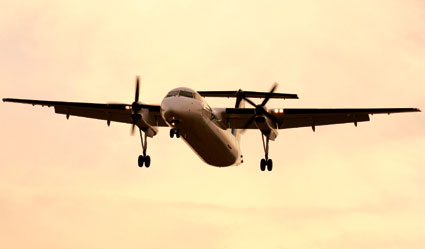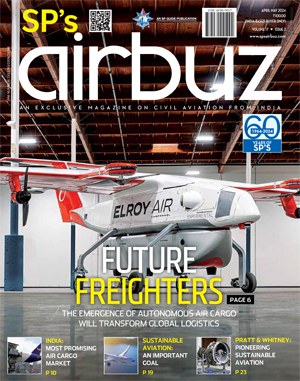Corporate - India is very important
John Nicholson, CEO, Aviation New Zealand, in an exclusive interview with SP’s Airbuz, outlines the company’s vision for India and its aviation market

Aviation New Zealand champions The country’s companies and product/service solutions to international audiences, encouraging the development of scale through collaboration and connects international customers to product and service solutions developed in New Zealand. Aviation New Zealand is a wholly-owned subsidiary of the Aviation Industry Association of New Zealand. It is a one stop shop for international companies wishing to do aviation business with New Zealand as it provides an umbrella brand under which companies can operate internationally.
SP’s Airbuz (SP’s): What is the current size and growth rate of the aviation industry in New Zealand?
John Nicholson (Nicholson): Industry exports were estimated at NZ$800 million (Rs 2,705 crore) in 2006, which is aimed to increase to NZ$2 billion (Rs 6,765 crore) by 2020. There are around 790 aviation and aviation-related companies in New Zealand. Most are small and privately owned with a few exceptions such as Air New Zealand. Airwork, which has a major international growth strategy, would be the second largest company.
SP’s: What are Aviation New Zealand’s span of activities and collaborations abroad?
Nicholson: Officially, Aviation New Zealand was launched internationally at the Airport and Airline Expo in Delhi in March 2008. While this was the international launch, it was quickly clear that a number of things had to be properly organised in New Zealand before Aviation New Zealand could take on offshore assignments. In the early days, a South Pacific focus was adopted, relationships were developed with the Association of South Pacific Airlines and we participated in two of the conferences organised by it. We were able to gather groups of companies together to provide a more comprehensive understanding of New Zealand’s aviation capabilities raking in good business for the New Zealand companies.
Aviation New Zealand is now focusing on three countries, India, Vietnam and China, which reflects the complexity of these markets and the fact that New Zealand companies are willing to share knowledge about them to help in the success of other companies. Encouraging collaboration amongst New Zealand companies enables us to offer the scale and breadth of solutions that these markets require.
SP’s: Where does India stand in the long-term strategy of Aviation New Zealand?
Nicholson: India is very important. Although we have considerable information on the market, there is no substitute for being in the market and developing the relationships and personal insights required for commercial success. When I canvassed members of Aviation New Zealand earlier this year about the markets, they would most like to go in for a collaborative mission and India emerged as the top priority. During the visit, we were able to make significant progress; the time given to the mission by the senior management of the visiting companies was considerable. In many cases, the group meetings proceeded into more detailed one-to-one meetings (New Zealand company and the most appropriate person at the airline). We hope to see several of those we met in India last month at the New Zealand stand at the Singapore Airshow, February 2 to 7, 2010. We also hope to see several, including the regulators, in New Zealand in the first half of 2010. New Zealand companies are following up with the Indian companies and we are confident that some mutuallybeneficial long term relationships will fructify. A few other New Zealand companies have already expressed interest in participating in similar future visits to India.
SP’s: Do you have plans to set up a maintenance, repair and overhaul (MRO) facility in India?
Nicholson: The possibility of a collaborative MRO was raised by a number of companies we met in November. However, any such decision would be made by the New Zealand MRO operators as developing any such possibility will require careful consideration.
SP’s: India has a policy of establishing Special Economic Zone (SEZ) for the aviation sector. Do you have any plans to set up joint ventures with Indian companies in SEZs in India?
Nicholson: We received briefings on several aeroparks while in India. CAPA Aeropark was one such possibility. Ashley Smout, the Chairman of Aviation New Zealand, is a member of the CAPA Aeropark Eminent Council. We are keen to understand these concepts and their relevance for New Zealand. A few of the Indian companies are discussing long-term relationships with some of the New Zealand companies but the finer points still need to be worked out. However, New Zealand companies are considering new ways of doing business in India and achieving a greater degree of market engagement.
SP’s: What are the products and service solutions you plan to promote in India?
Nicholson: At this stage, it is ambiguous but pilot training and engineering was one of the areas covered in-depth on the mission.
SP’s: Has the global economic downturn affected the aviation sector in New Zealand? What steps, if any, have been taken to cope with its adverse effects?
Nicholson: Some of the companies with a pure New Zealand focus have been struggling. However, there have been a number of New Zealand companies developing niche products with real international demand.
SP’s: What is the status of aviation entrepreneurs in New Zealand?
Nicholson: The Aviation Industry Cluster, previously Waikato Aviation Cluster, is the centre for General Aviation based on the presence of Pacific Aerospace, CTC, component manufacturers, aviation designers and a number of aviation entrepreneurs. The cluster is developing new capabilities, integrating with supply chains, and driving the creation of a state-of-the-art specialist aviation painting facility with a South-east Asian and Australasian reach. The Nelson Aviation Cluster is looking to develop a reputation as a one-stop shop for aviation repair and maintenance. The Air Nelson Engineering facility is to be expanded almost twice its capacity to service the Q300 and Q400 fleets. New Zealand has considerable expertise in the replica and restoration industries with concentrations of companies in Ardmore, Dunedin, Mandeville, Masterton, Omaka, and Wellington. Capabilities ranging from parts to complete aircraft include antique aircraft, classic aircraft, World War I fighters and war birds.
SP’s: How successful has fractional ownership been in general aviation in New Zealand?
Nicholson: This is not common in New Zealand as the economy is too small for fractional ownership to be a significant market.
SP’s: What is the scenario with respect to pilot training in your country?
Nicholson: There is a well-established system which ensures cadets move from ab initio training through to command positions in airlines and other aviation companies. There is an open and transparent pilot training process, which is overseen by the New Zealand Civil Aviation Authority. Companies that train international pilots must, among other things, deliver qualifications that are approved by the New Zealand Qualifications Authority, be signatories to the Code of Practice for the Pastoral care of International Students, and be signatories to the Aviation Industry Association Code of Practice for Professional Pilot Training. International students studying in New Zealand have their fees guaranteed by the Government so that they are fully protected in the unlikely event of closure or suspension of the activities of the pilot training school.





